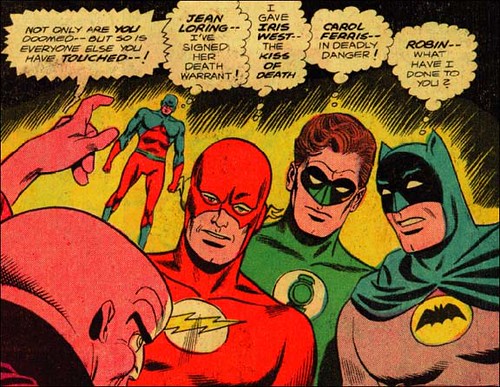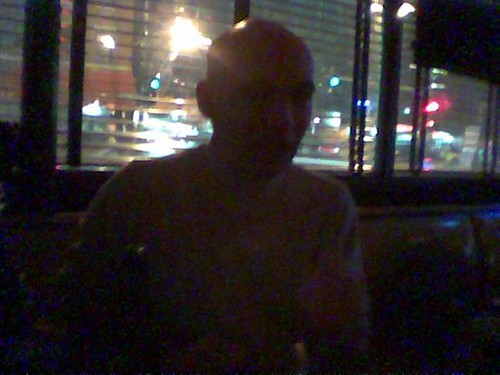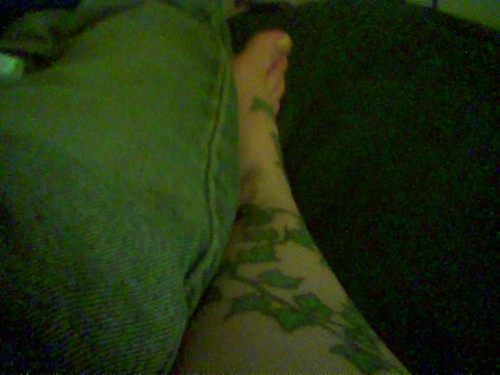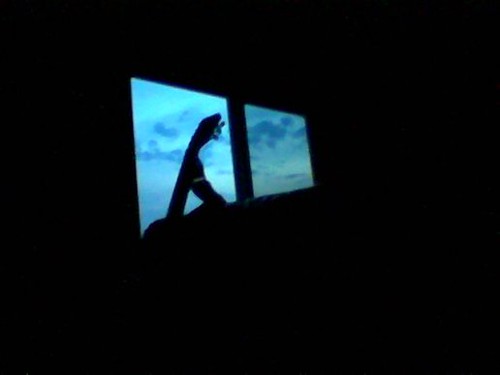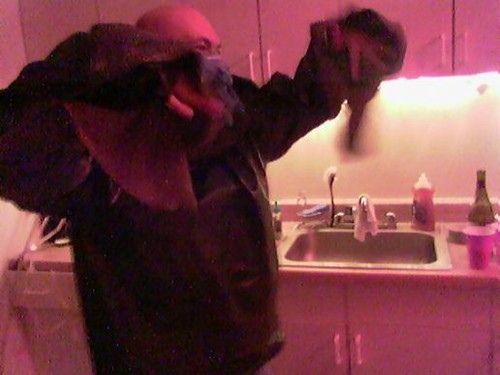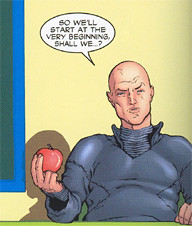
It might be a few weeks old by now, but there's an excellent interview with Grant Morrison up at Newsarama about his upcoming All-Star Superman project with Frank Quitely. I like Grant's interviews almost as much as his comics--he's always interesting and entertaining and storytelling. I've never thought about Superman very much, being a Marvel kid growing up and all, and he's always seemed to be a pretty boring character. When I was 18 or 19 I came up with a very involved Golden Age to the modern-era storyline that involved a cast of superheroes that mirrored the Marvel and DC lines, but played out in what I thought of as the Watchmen mold--I took fantastic ideas and then tried to play it straight. The only thing that made sense for the Superman-style character (I named him "Mr. Victory"--he showed up in 1939, keep in mind) was to have him fly off into space for a few decades, traveling the cosmos, before returning with the intention of re-molding human civilization to his liking. Something Grant touches on in this interview is that in our world, the real world, we tend to view people who are different and/or successful with mistrust and hate. But the thing about comics is that you can write about a world that *isn't* ours. Hell, that's the thing about all fiction, and it's something I think a lot of people forget about.
"That would never happen," is probably the most common complaint, ever, lobbed at any piece of fiction. Whether it's teenagers going into a dark room, a couple staying together when it seems like they should part, a rocket ship from another world crash-landing in Kansas and being discovered by a loving, but childless, couple--"it would never happen like that." But the thing is, it doesn't have to--hell, it's not supposed to. It's a made-up story. Everything you read on the page or see on the screen is a choice the writer makes, and makes for a reason. So in comics, and specifically in DC Comics, most folks love Superman, super-powered stranger from another world or not.
As far as writing about Superman, one comment from Grant really got my brain working. He was at the San Diego Comic-Con a few years ago, out front talking with then-JLA editor Dan Raspler. Someone in a Superman outfit comes walking by--and if you've been to a comic show you know the sort of dude I mean--and Grant and Dan started asking him questions, which he answered in-character. Things like what he thought of Batman, stuff like that, and the dude in the suit was all about it. But what struck me was when Grant said this:
"The thing that really hit me though, wasn't so much what he was saying as how he was sitting. The guy was perched on a bollard with one knee drawn up, chin resting on his arms. He looked totally relaxed...and I suddenly realized this was how Superman would sit. He wouldn't puff out his chest or posture heroically, he would be totally chilled. If nothing can hurt you, you can afford to be cool. A man like Superman would never have to tense against the cold; never have to flinch in the face of a blow. He would be completely laid back, un-tense. With this image of Superman relaxing on a cloud looking out for us all in my head, I rushed back to my hotel room and filled dozens of pages of my notebook with notes and drawings."
And somehow, that's how I've never thought of Superman. As a guy sitting on a bench, a guy I could write about. That image, plus Grant's overarching idea for his All-Star story--"The 12 Labors of Superman"--that gets me excited to see what Grant and Frank are going to do with this character and in this comic book. Well, that, and this statement:
"I just read - yesterday in fact - the story 'Superman's New Power' which appeared in Superman #125 from November 1958. And guess what Superman's new power was in the 'conservative' ‘50s. That's right - it's a teeny-tiny little Superman who shoots out from the palm of the big Superman's hand and does everything better than Superman himself, leaving the full-size Superman feeling redundant and worthless. Holy analysis, Batman! It's mindbending, brilliant and eerie work. This is what it would be like if Charlie Kaufmann wrote and directed the Superman movie and it's far from goofy or childish, it's genuinely affecting and slightly disturbing to read Superman saying stuff like 'Everyone's impressed except ME! Don't they understand how I feel -- playing second fiddle to a miniature duplicate of myself...a sort of SUPER-IMP?'
"And people think I'M weird ? I %$%$^ wish I was weird like this! I wish pop comics today had the balls to be as poetic and poignant and truly 'all-ages' again, and a little less self-conscious. I feel a little ashamed for not even daring to think of a magnificent tiny Superman who makes the real Superman feel inadequate every time he springs from his hand. Those kinds of stories were like weird fever dreams and they sold millions and millions of copies every month."
And THAT'S what I've been thinking about lately, even before I read this interview. That's the thing I started to tap into when I wrote "She's the Speckle," which a few of you have read--I didn't think about the kinds of stories I write or where I wanted that particular story to go, I just let it go where it would. I let weird ideas come into my mind and I put them on the page, not bothering to think about short story structure, or what the flow of the piece as a whole would be. And the story I wrote is strange and has a weird rhythm to it, but it's a rhythm all the same. And it feels like I'm on to something with it. It's missing in some of the things I've written since, when I've fallen back into old habits of storytelling, when I've held back from something--not when I've thought of something and not written it down, but when I've thought something and not pushed myself to think of something stranger, or something bigger or slightly beyond what I was willing to settle for.
In 1958 someone wrote a Superman story--and it couldn't have been more than 20 pages--where a tiny Superman shot out of the palm of the normal Superman, and made the normal Superman feel inferior. I know a whole lot of really good writers these days, but none of them have done anything lately as weird and as wonderful as that. But they should be--I should be--and like Grant, we should all be a little ashamed that we haven't dared to think of anything like that yet.
